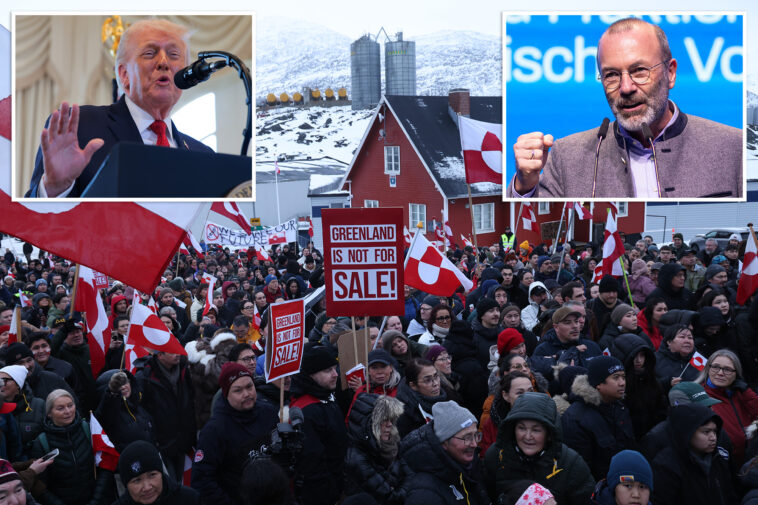The European Union is set to freeze its trade deal with the US, with its members threatening to use its trade “bazooka” policy against America after President Trump threatened a new wave of tariffs in his bid to purchase Greenland.
European leaders were thrown for a loop after Trump announced a plan to levy an additional 10% tariff on goods from Denmark, Norway, Sweden, France, Germany, the UK, the Netherlands and Finland — with plans to hike it to another 25% until a deal is reached for the US to take control of Greenland.
The plan led Manfred Weber, the president of the European People’s Party (EPP), to announce that the EU will not approve of the 15% tariff deal Trump struck last summer, saying it cannot be allowed to go through given the current tension with the US.
“The EPP is in favor of the EU-US trade deal, but given Donald Trump’s threats regarding Greenland, approval is not possible at this stage,” Weber wrote of the upcoming Wednesday vote. “The 0 percent tariffs on US products must be put on hold.”
The move appears to have the EU’s full backing as UK Prime Minister Keir Starmer condemned Trump’s threats as “completely wrong,” with French President Emmanuel Macron calling it “unacceptable.”
Karin Karlsboro, the Swedish MEP who serves as coordinator on trade for the EU’s Renew party, confirmed that there would not be enough votes in parliament to push through the deal Trump had previously touted as a win for his tariff policy last year.
Instead, Karlsboro said Europe now has a reason to deploy its “anti-coercion instrument,” unofficially known as its trade ‘bazooka’ policy, which deploys financial retaliation against anyone trying to threaten or strongarm the EU.
“The EU must prepare to respond to President Trump’s tariff attacks, including those targeting Sweden,” she told Politico. “We cannot rule out either retaliatory tariffs or the use of the ‘bazooka’ if the pressure and coercion continue.”
The policy could allow the EU to slap restrictions on American companies or service providers that do business in the continent, which risks starting an all-out trade war with the US.
It would fall to the European Commission to implement the “bazooka” policy, something Commission President Ursula von der Leyen has not raised yet as she hopes to find a diplomatic solution with the Trump administration.
“Dialogue remains essential, and we are committed to building on the process begun already last week between the Kingdom of Denmark and the US,” Leyen wrote.
The commission president also warned that Trump’s proposed tariffs would “risk a dangerous downward spiral.”
Trump announced his new tariff plan on Saturday, with the US directly targeting Denmark and its NATO allies who sent troops to Greenland this week as a show of European solidarity.
The president warned that the new tariff hikes would take effect on Feb. 1, with the import tax set to increase unless Denmark agrees to the “complete and total purchase of Greenland.”







